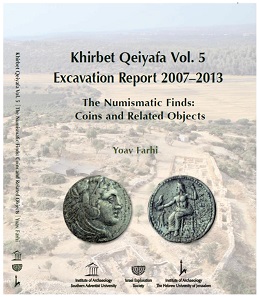June 2, 2016 – More than 600 coins and related objects were found at Khirbet Qeiyafa during the 2007-2013 excavation seasons. The earliest coins date from the end of the sixth century BCE and the latest from the British Mandate.
Yoav Farhi (with contributions by C. Lorber, S. Shalev and S. Shilstein), Khirbet Qeiyafa Vol. 5: Excavation Report 2007-2013, The Numismatic Finds: Coins and Related Objects. Jerusalem, Israel Exploration Society, 2016. ISBN: 978-965-221-107-1. $48. Airmail postage: $22 to USA; $16 to Europe.
These coins almost all relate to three phases in the history of the site following the Iron Age occupation: the Late Persian to Early Hellenistic period (late fourth to early third centuries BCE), the Hasmonaean period up to the destruction of the Second Temple (first century BCE to first century CE) and the Late Roman and Byzantine periods (fourth to fifth centuries CE).
The numismatic finds from the Late Persian to Early Hellenistic period are extraordinary in their amount and rarity and include many types that were hitherto unknown from controlled excavations. The variety of coins that were found – imported Archaic and Classical Greek coins, coins from Phoenicia, local coins from mints in Jerusalem, Philistia, Samaria and possibly Edom, as well as Macedonian and Ptolemaic coins – contributes a great deal to our knowledge of the monetary economy of Judaea and its neighbours during the transition from the Persian to the Hellenistic period.
The exposure of this stratum and its numerous small finds is of great significance for the study of the transition from the Persian to the Hellenistic period in this region, since no site exposed so far in Israel in general, or in this region in particular, contains a comparable single-period occupation stratum that can be so precisely dated to this period.
Orders should be sent to the Israel Exploration Society P.O.BOX. 7041, Jerusalem 91070, Israel Tel: 972-2-6257991, Fax: 972-2-6247772 or via email.
You may also wish to visit the website of the Israel Exploration Society.




